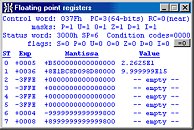Thursday, June 14th 2018

Intel Processors Hit by "Lazy FP State Restore" Vulnerability
Security researchers have discovered a vulnerability affecting all modern Intel Core and Xeon processors, which is an exploit of a performance optimization feature called "lazy FP state restore," which can be exploited to sniff out sensitive information, including cryptographic keys used to protect sensitive data. The flaw affects all x86 micro-architectures by Intel, "Sandy Bridge" and later.
The "lazy FP state restore" feature is a set of commands used to temporarily store or restore the FPU states of applications running "lazily" (as opposed to "eagerly"). Red Hat put out an advisory stating that numbers held in FPU registers could be used to access sensitive information about the activities of other applications, including encryption keys. Intel began working with popular OS vendors to quickly roll out software patches against the vulnerability.
Sources:
Intel, Red Hat, TheHackerNews
The "lazy FP state restore" feature is a set of commands used to temporarily store or restore the FPU states of applications running "lazily" (as opposed to "eagerly"). Red Hat put out an advisory stating that numbers held in FPU registers could be used to access sensitive information about the activities of other applications, including encryption keys. Intel began working with popular OS vendors to quickly roll out software patches against the vulnerability.

43 Comments on Intel Processors Hit by "Lazy FP State Restore" Vulnerability
Modern encryption has a result typically 512 bits, with older encryption ranging from 128-256 bits. These signatures are generated using a number of factors including random seeds, server ticks, timezones, etc., that are typically stored in floating point registers.
Neither is truly secure. If you worry that much, you are basically going to have to worry. Sorry.
I suppose you could but I would still hate you for doing it.
It does it all the time. Trust me.
You can see the problem in action by pressing F12 in your web browser and do the following calculations in the console:
0.1 + 0.2
0.01 + 0.06
Now try some rounding in JavaScript:
parseFloat(55.555).toFixed(2);
parseFloat(1.3555).toFixed(3);
(just paste it into the console, line by line)
Remember that banks may calculate interest and fees monthly or even daily, these "small" rounding errors can grow exponentially when multiplying thousands of times.
This subject is actually highly relevant for software development. I've had several episodes with colleagues who insist this is a bug in the code or in the programming language, who even struggle to understand it after a detailed explanation, despite having master degrees in CS and many years of experience. The only "bug" is the programmer's lack of understanding of how theoretical math is applied to actual hardware and software, and the sad thing is that this is elementary stuff in CS.
</math_lesson>